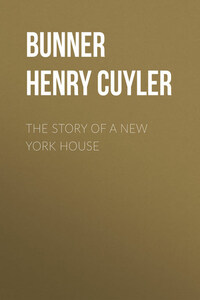"I hear," said Mrs. Abram Van Riper, seated at her breakfast-table, and watching the morning sunlight dance on the front of the great Burrell house on the opposite side of Pine Street, "that the Dolphs are going to build a prodigious fine house out of town – somewhere up near the Rynders's place."
"And I hear," said Abram Van Riper, laying down last night's Evening Post, "that Jacob Dolph is going to give up business. And if he does, it's a disgrace to the town."
It was in the summer of 1807, and Abram Van Riper was getting well over what he considered the meridian line of sixty years. He was hale and hearty; his business was flourishing; his boy was turning out all that should have been expected of one of the Van Riper stock; the refracted sunlight from the walls of the stately house occupied by the Cashier of the Bank of the United States lit with a subdued secondary glimmer the Van Riper silver on the breakfast-table – the squat teapot and slop-bowl, the milk-pitcher, that held a quart, and the apostle-spoon in the broken loaf-sugar on the Delft plate. Abram Van Riper was decorously happy, as a New York merchant should be. In all other respects, he was pleased to think, he was what a New York merchant should be, and the word of the law and the prophets was fulfilled with him and in his house.
"I'm sure," Mrs. Van Riper began again, somewhat querulously, "I can't see why Jacob Dolph shouldn't give up business, if he's so minded. He's a monstrous fortune, from all I hear – a good hundred thousand dollars."
"A hundred thousand dollars!" repeated her husband, scornfully. "Ay, and twice twenty thousand pounds on the top of that. He's done well, has Dolph. All the more reason he should stick to his trade; and not go to lolling in the sun, like a runner at the Custom-House door. He's not within ten years of me, and here he must build his country house, and set up for the fine gentleman. Jacob Dolph! Did I go on his note, when he came back from France, brave as my master, in '94, or did I not? And where 'ud he have raised twenty thousand in this town, if I hadn't? What's got into folks nowadays? Damn me if I can see!"
His wife protested, in wifely fashion. "I'm sure, Van Riper," she began, "you've no need to fly in such a huff if I so much as speak of folks who have some conceit of being genteel. It's only proper pride of Mr. Dolph to have a country house, and – "(her voice faltering a little, timorously) "ride in and – and out – "
"Ride!" snorted Mr. Van Riper. "In a carriage, maybe?"
"In a carriage, Van Riper. You may think to ride in a carriage is like being the Pope of Rome; but there's some that knows better. And if you'd set up your carriage," went on the undaunted Mrs. Van Riper, "and gone over to Greenwich Street two years ago, as I'd have had you, and made yourself friendly with those people there, I'd have been on the Orphan Asylum Board at this very minute; and you would – "
Mr. Van Riper knew all that speech by heart, in all its variations. He knew perfectly well what it would end in, this time, although he was not a man of quick perception: "He would have been a member of the new Historical Society."
"Yes," he thought to himself, as he found his hat and shuffled out into Pine Street; "and John Pintard would have had my good check in his pocket for his tuppenny society. Pine Street is fine enough for me."
Mr. Van Riper had more cause for his petulancy than he would have acknowledged even to himself. He was a man who had kept his shop open all through Clinton's occupancy, and who had had no trouble with the British. And when they were gone he had had to do enough to clear his skirts of any smirch of Toryism, and to implant in his own breast a settled feeling of militant Americanism. He did not like it that the order of things should change – and the order of things was changing. The town was growing out of all knowledge of itself. Here they had their Orphan Asylum, and their Botanical Garden, and their Historical Society; and the Jews were having it all their own way; and now people were talking of free schools, and of laying out a map for the upper end of the town to grow on, in the "system" of straight streets and avenues. To the devil with systems and avenues! said he. That was all the doing of those cursed Frenchmen. He knew how it would be when they brought their plaguy frigate here in the first fever year – '93 – and the fools marched up from Peck's Slip after a red nightcap, and howled their cut-throat song all night long.
It began to hum itself in his head as he walked toward Water Street —Ça ira – ça ira – les aristocrats à la lanterne. A whiff of the wind that blew through Paris streets in the terrible times had come across the Atlantic and tickled his dull old Dutch nostrils.
But something worse than this vexed the conservative spirit of Abram Van Riper. He could forgive John Pintard – whose inspiration, I think, foreran the twentieth century – his fancy for free schools and historical societies, as he had forgiven him his sidewalk-building fifteen years before; he could proudly overlook the fact that the women were busying themselves with all manner of wild charities; he could be contented though he knew that the Hebrew Hart was president of that merchants' club at Baker's, of which he himself would fain have been a member. But there was some thing in the air that he could neither forgive nor overlook, nor be contented with.








